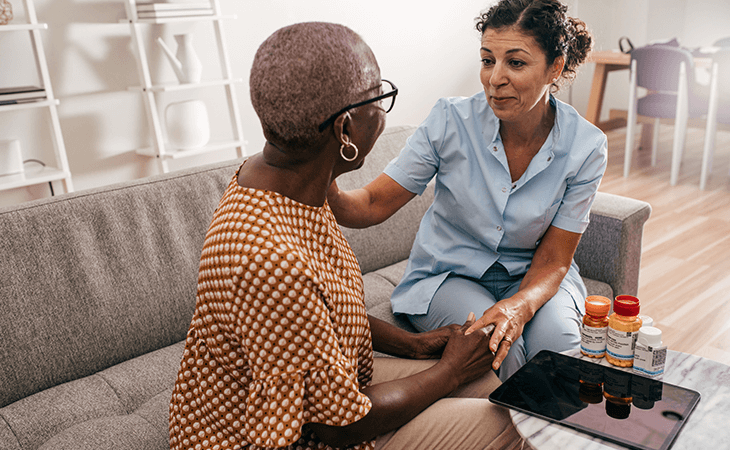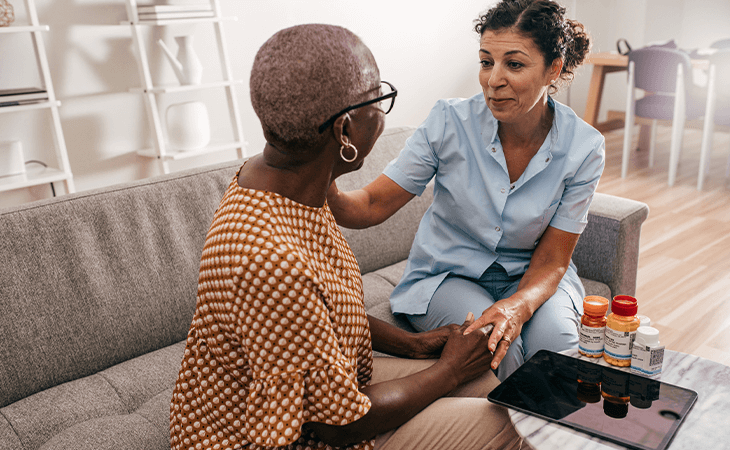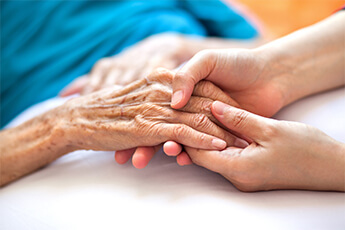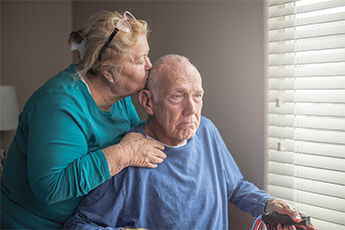Getting at-home support for kidney cancer


If you’re undergoing treatments for kidney cancer or metastatic kidney cancer, you may need to change how you manage daily tasks at home. Some people benefit from extra at-home support. Whatever your needs, these suggestions can help.
From the community: “When I rook my Mom out of Adult Daycare she was accessed for Home Health Care but the nurse that came out recommended Hospice. Now when it first started I had all kinds of people comming and going, now we have a routine and it's wonderful. I have a nurse come out every Tuesday to do vitals and see about overall health, Mon., Wed., and Fri I have an aide out to bathe her, wash her hair even feed her once in a while. I have been told I can leave the house when they are here up to about an hour if I wish, Once every two weeks I have a volunteer in for 2-3 hours for me to just leave and do whayever I need or want to do, Once a monthe I have a social worker out to see about me and I have access to a chaplin. I have a number to call for anything I need and if I need someone after hours. It took a while to get used to these folks but they are so helpful once we got a pattern established, The nurse will call and check on things every Friday to see if I need anything.” – Inspire member
Consider home healthcare services
Professional caregivers can help promote a safer recovery after nephrectomy surgery to remove a cancerous kidney or kidney tumor, or as you undergo other treatments and manage their side effects. It can take up to six weeks to recover from a nephrectomy. You won’t be allowed to lift anything heavy during this time, and you’ll need to keep the incision site clean and change wound coverings to prevent an infection.
Different types of home healthcare providers include:
Nurses: A licensed practical nurse (LPN) can change bandages, give medications, and provide basic medical care. A registered nurse (RN) is more actively involved in case management. They work closely with your physician to implement your care plan. A registered nurse can also draw blood, take vital signs, and give IV medications.
Home health aides: A certified nurse assistant (CNA) or other home health aide works under the supervision of a nurse or other medical professional. This aide can assist you with daily living tasks like grooming, bathing, getting dressed, using the bathroom, and moving around the house. They may also provide wound care and administer medications.
Palliative care specialists:Palliative care focuses on improving quality of life for people living with chronic conditions like kidney cancer. These specialists can offer tips to help you live better with kidney cancer. As part of your care team, they work closely with your doctor to address disease symptoms and treatment side effects like pain or fatigue. If your disease progresses to an advanced stage of kidney cancer, you may benefit from hospice. These specialists provide end-of-life care.
Personal care aide: Also called a personal attendant, this person performs household tasks like cooking, simple cleaning, and laundry. They don’t provide medical services.
Volunteers or companions: A companion is a paid professional who stays with you when other family members are unable to do so. They may help prepare meals or do some light housework. There are also volunteers (usually trained through a hospice program) who can keep you company.
From the community: “…Check with your doctor to see if he would approve your mom for hospice care. They do not have to be dying real soon for you to beable to use hospice. I just started dad with them and they have given me a lot of help as well. Doesn't hurt to just call and talk to them about what is going on in your life and your mom might really like the idea after she talks to them because it gives her outside interaction as well without her having to leave home.” – Inspire member
Get help with your diet
It’s important to eat a balanced diet when you have kidney cancer, but you also need to watch your intake of protein, certain minerals, and even liquids. Foods high in protein, phosphorous, and potassium can make strained kidneys work even harder to clean impurities from your blood. If toxins build up, they can damage your kidneys and increase your risk for problems like heart disease.
A registered dietitian has the expertise to know which foods are best for people with kidney cancer — as well as the foods to avoid. This dietary expert can ensure you get the vitamins and nutrients you need without jeopardizing your kidney health. For instance, it can be tricky to determine how much protein is safe to consume each day when you have kidney cancer. This number changes depending on your weight and kidney function. Some protein sources are easier for your body to break down.
Dietitians can also make dietary suggestions for the times when you experience nausea, mouth sores, constipation, loss of appetite, or other treatment side effects. And if you need assistance with meals, they can arrange for home delivery of meals or groceries.
From the community: “…also with hoome PD you can't have pets in the room, must dedicate and entire room of large space to sterile dressings and all sorts of equipment that comes loaded off a truck..so it is like a hospital in your own house....not allowing a cat or dog in either place, where PD is done, or in the supply room could be an issue, and also the space needed…” – Inspire member
Learn to do dialysis at home
If you’re among the 1 in 3 people with kidney cancer who develops chronic kidney disease, you may find yourself needing dialysis. This treatment for kidney failuredoes the work of your kidneys, removing toxins from your blood. You can get dialysis at a hospital or outpatient center, or you can learn to do dialysis at home.
If you choose the at-home option, you’ll work with a medical equipment company to get started. A nurse education specialist or another expert will teach you and a care partner (usually a family member or friend) how to properly perform dialysis at home. This specialist can also help you make dialysis a part of your daily routine and get your home organized for the necessary supplies and equipment.
Finding and paying for at-home support
Your doctor or a social worker at your cancer center can connect you with resources to help you get the at-home support you need. You may want to start with a professional home care agency. Many of these agencies are certified by Medicare, which means they meet certain patient care standards, and they carefully screen and supervise agency employees. It also means that Medicare and Medicaid may pay for some of the services.
You can also check with your health insurer about coverage or the U.S. Veterans Administration (VA) if you’re a military veteran. Some cancer associations and nonprofit organizations also provide free or discounted support services.
Sources
Who provides home care services? American Cancer Society. July 2021.
Hiring home care services. American Society of Clinical Oncology. February 2021.
Support at home. Cancer Research UK. June 2020.
Types of home health care services. Johns Hopkins Medicine.
Kidney removal—discharge. MedlinePlus. April 2021.
Kidney cancer. National Kidney Foundation.
What is a home health nurse? Western Governors University (UK). December 2020.
Disclaimer
Member comments are lightly edited for length and to remove identifying information but are otherwise reproduced as they appear in the community as part of public posts.
This content is for general informational purposes only and does not necessarily reflect the views and opinions of any organization or individual. The content should not be used as a substitute for professional medical advice, diagnosis, or treatment. Please consult your healthcare provider about any questions you may have regarding a medical condition.




